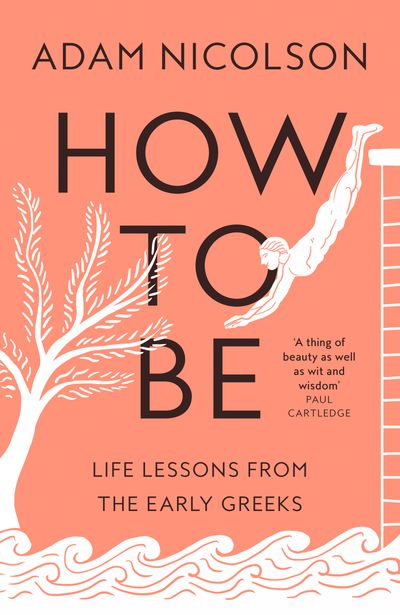How to Be: Life Lessons from the Early Greeks
What is the nature of things? Must I think my own way through the world? What is justice? How can I be me? How should we treat each other?
Before the Greeks, the idea of the world was dominated by god-kings and their priests, in a life ruled by imagined metaphysical monsters. 2,500 years ago, in a succession of small eastern Mediterranean harbour-cities, that way of thinking began to change. Men (and some women) decided to cast off mental subservience and apply their own worrying and thinking minds to the conundrums of life.
These great innovators shaped the beginnings of philosophy. Through the questioning voyager Odysseus, Homer explored how we might navigate our way through the world. Heraclitus in Ephesus was the first to consider the interrelatedness of things. Xenophanes of Colophon was the first champion of civility. In Lesbos, the Aegean island of Sappho and Alcaeus, the early lyric poets asked themselves ‘How can I be true to myself?’ In Samos, Pythagoras imagined an everlasting soul and took his ideas to Italy where they flowered again in surprising and radical forms.
Prize-winning writer Adam Nicolson travels through this transforming world and asks what light these ancient thinkers can throw on our deepest preconceptions. Sparkling with maps, photographs and artwork, How to Be is a journey into the origins of Western thought.
Hugely formative ideas emerged in these harbour-cities: fluidity of mind, the search for coherence, a need for the just city, a recognition of the mutability of things, a belief in the reality of the ideal — all became the Greeks’ legacy to the world.
Born out of a rough, dynamic—and often cruel— moment in human history, it was the dawn of enquiry, where these fundamental questions about self, city and cosmos, asked for the first time, became, as they remain, the unlikely bedrock of understanding.
EARLY PRAISE FOR HOW TO BE -
‘What links all Nicolson’s writing, though, is a tireless and tigerish sense of wonder and curiosity; a bounding willingness to immerse himself and his reader deeply in his subject: life… I’m not sure I’ve ever read a book that marries such profundity with such a sense of fun. How to Be delivers wholeheartedly on the promise of its vaunting title. It is like a net strung between the deep past and the present, a blueprint for a life well lived’OBSERVER -
‘Seductive… a poetic tour of philosophical thought’SPECTATOR -
‘Nicolson’s gaze is deeply attentive - the stumpy pillars of ruined harbour cities, the lush slope of an alluvial plain, tiny animals on coins, pots, sculptures . . . all these things he weaves them into a vivid picture that puts flesh on shadowy bones. He has infused his quest for wisdom with a sense of poetry’THE TABLET -
”'Passionate, poetic, and hauntingly beautiful, Adam Nicolson’s account of the west’s earliest philosophers brings vividly alive the mercantile hustle and bustle of ideas traded and transformed in a web of maritime Greek cities, where men and women first questioned the nature of the universe and established what it is to be human. In this life-affirming, vital book, those ideas sing with the excitement of a new discovery” - David Stuttard
”'It’s hard not to be dazzled by this book. It is both scholarly and imaginative but the real dazzle lies in its depiction of philosophy not only as a way of life but as something alive itself, growing like a plant out of a particular place, something restless, searching and vital in every sense. No one else writes with the originality, energy and persuasiveness of Adam Nicolson. It’s like encountering the Greek sea. It takes your breath away” - Laura Beatty, bestselling author of Lost Property
